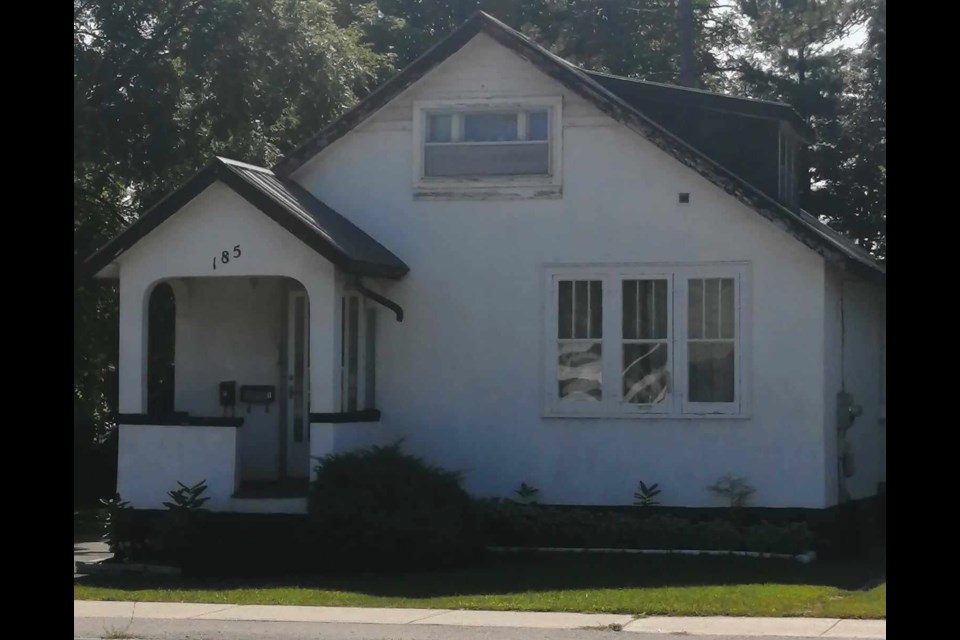The freestone mining activities in Corsham, England, were so extensive that people wishing to build or buy a house in the area today are encouraged to get a professional geological search done to find out if the property lies above one of the many miles of historic mine shafts snaking through the region.
This is where the Jones brothers of 185 Dunlop St. W. in Barrie came from. Douglas and William Jones grew up in the Westwells section of Corsham, where every male in their neighbourhood, aged 13 years and older, was employed as a quarry worker.
Corsham sits on the southern edge of the famous Cotswold region, a place popular with tourists for its 16th-century honey-coloured stone cottages and thatched roofs. The Joneses were too busy for any of that.
Since at least the 1500s, generations of Joneses had lived in Melksham, a community to the south, supported for centuries by the woolen and weaving industry. When this economy declined, there were riots, lootings and more than one hanging, so the Jones family migrated to nearby Corsham in the late 1700s.
Douglas and William became the third generation of Jones men to work as quarrymen in Corsham. Quarrymen is a bit of a misnomer as the work was not done above ground but deep in the earth, down a mine shaft.
They were miners, just like their forefathers, uncles and cousins before them. There was plenty of work to keep them all going in 1900, but a faraway place was booming and desperate for manpower. The Canadian Shield was filled with minerals in need of extraction, and British miners in search of adventure were just right for the job.
Douglas and William were two of the five sons born to Thomas Jones and his wife, Mary Aust. Of these five sons, only Frank did not choose to go to Canada.
It may be that William and Douglas were the first family members to try their luck in this country. The news from northern Ontario was big — so big that it most likely made it into English newspapers. There was a silver rush underway near the emerging community of Cobalt in the Timiskaming District, which inspired the brothers to sail to Canada in 1909.
From a population of zero in 1900 to 12,000 in 1911, Cobalt had more than 3,000 men engaged in mining. William Jones sent for his wife and children. The men sent for their brother, Arthur.
As the Cobalt silver boom continued, yet another Jones brother arrived, in 1920. As George Jones began his Canadian mining career, Arthur Jones had had enough of it and returned to England.
Even though Frank Jones, the fifth brother, never went to mine in Canada, two of his sons did. Harold and Fred arrived in the 1930s. Harold, and their uncle, George Jones, witnessed Fred’s 1937 wedding to June Last in Timmins.
Sadly, Fred Jones became one of the casualties of underground mine life. He succumbed to tuberculosis, exacerbated by silicosis, in 1940 at age 35. His brother, Harold Jones, was called once again to be a witness as he acted as the informant on the death record of his sibling.
Not long after the death of his nephew, Douglas Jones gave up as well. Some 45 years of toiling underground, in two countries, was plenty for him. He retired and moved to Barrie, settling at 185 Dunlop St. W.
In 1949, Douglas married Florence Wice, of Innisfil. Soon, William Jones came to join them. He was very ill, suffering from silicosis, just as his nephew had, that terrible affliction that goes with years of hazardous underground work.
William Jones died at his brother’s home in 1953. Douglas followed in 1956. Florence Jones survived Douglas by almost 30 years and took in boarders during her last few years at 185 Dunlop St. W.
Each week, the Barrie Historical Archive provides BarrieToday readers with a glimpse of the city’s past. This unique column features photos and stories from years gone by and is sure to appeal to the historian in each of us.



